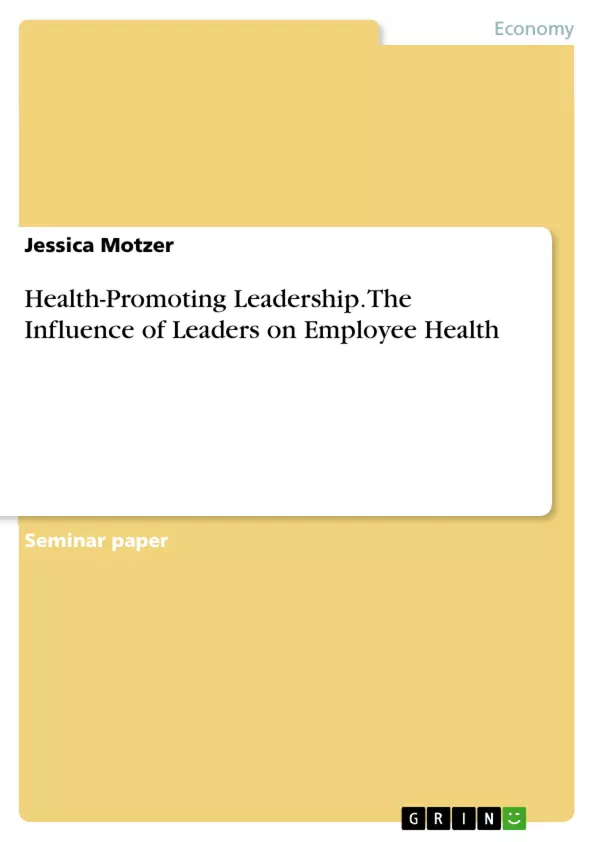This work deals with the question to what extent the concept of health-promoting leadership is suitable for reducing absenteeism among employees. Despite the relatively young field of research and the partly one-sidedly examined factors, the present results read promising.
To answer the key question, an overview of the current state of research is given. The relevant terms “health” and “leadership” are then narrowed down. After a brief retrospective on the history of the emergence of health-promoting leadership using socio-technical system approaches, two instruments are also presented - the "Health-oriented Leadership" concept from Franke & Felfe and the four-level model from Spieß & Stadler.
Although the focus of the explanations is on the potential of the health-promoting management approach, a critical appraisal should also show its limits. After all, the effects of management components on the health of employees have not been researched for very long.
The subsequent situation analysis of a case study shows on the one hand the possible effects of absenteeism for companies and their potential causes. On the other hand, it describes the ways in which a manager can have a direct or indirect influence on their employees or their health.
Based on this, recommendations for action for executives, which can also be used beyond the purpose of reducing absenteeism, convey an idea of the practical applicability of health-promoting leadership.
Inhaltsverzeichnis (Table of Contents)
- Summary
- Introduction
- Introduction and overview of health-promoting leadership
- Current state of research
- Health
- Leadership
- Theoretical foundations
- The emergence – socio-technical system approaches
- The "Health-oriented Leadership" concept according to Franke & Felfe
- The four-level model according to Spieß & Stadler
- Limit
- Root cause analysis of the situation description
- Absenteeism
- Definition of terms
- Consequences of absenteeism
- Causes of absenteeism
- Influence of the manager
- Direct influence
- Indirect influence
- Recommendations for action and practical transfer
- Determination of the current situation
- Concrete measures
- Coaching – Change in leadership behavior
- Employee appraisal
- Change in the working environment and the organization of tasks
- The potential and limitations of health-promoting leadership in reducing absenteeism.
- The relationship between leadership behavior and employee health.
- The impact of absenteeism on companies and its potential causes.
- The direct and indirect influence of managers on employee health.
- Practical recommendations for managers to implement health-promoting leadership principles.
Zielsetzung und Themenschwerpunkte (Objectives and Key Themes)
This work examines the concept of health-promoting leadership and its potential to reduce employee absenteeism. It explores the current research, defines relevant terms, and introduces two key models: Franke & Felfe's "Health-oriented Leadership" concept and Spieß & Stadler's four-level model.
Zusammenfassung der Kapitel (Chapter Summaries)
The first chapter introduces the concept of health-promoting leadership and its potential to reduce absenteeism. It reviews the current research, defines the terms "health" and "leadership," and presents two theoretical models. The chapter concludes with a discussion of the limitations of the health-promoting leadership approach. The second chapter delves into the root causes of absenteeism, discussing its definition, consequences, and potential causes. It then explores the influence of managers on employee health, distinguishing between direct and indirect influences. The third chapter provides practical recommendations for managers to implement health-promoting leadership principles. This includes concrete measures such as coaching, employee appraisal, and changes in the working environment and task organization.
Schlüsselwörter (Keywords)
Health-promoting leadership, absenteeism, employee health, leadership behavior, organizational health, socio-technical systems, Franke & Felfe, Spieß & Stadler, direct influence, indirect influence, coaching, employee appraisal.
Frequently Asked Questions
What is the core concept of health-promoting leadership?
Health-promoting leadership focuses on how managers can positively influence employee health through their behavior, communication, and the organization of the work environment.
Can leadership behavior reduce absenteeism in companies?
Yes, research suggests that health-oriented leadership can reduce sick leave by lowering stress levels and increasing employee resources and satisfaction.
What is the "Health-oriented Leadership" concept by Franke & Felfe?
It is a theoretical model that differentiates between self-care (how leaders treat their own health) and staff-care (how they influence the health of their subordinates).
What are direct and indirect influences of a manager on health?
Direct influence occurs through interpersonal behavior and communication. Indirect influence happens through the design of working conditions, tasks, and organizational culture.
What practical measures can managers take?
The work recommends measures such as coaching to change leadership behavior, conducting structured employee appraisals, and optimizing task organization to reduce workload.
- Arbeit zitieren
- Jessica Motzer (Autor:in), 2017, Health-Promoting Leadership. The Influence of Leaders on Employee Health, München, GRIN Verlag, https://www.grin.com/document/1225472



